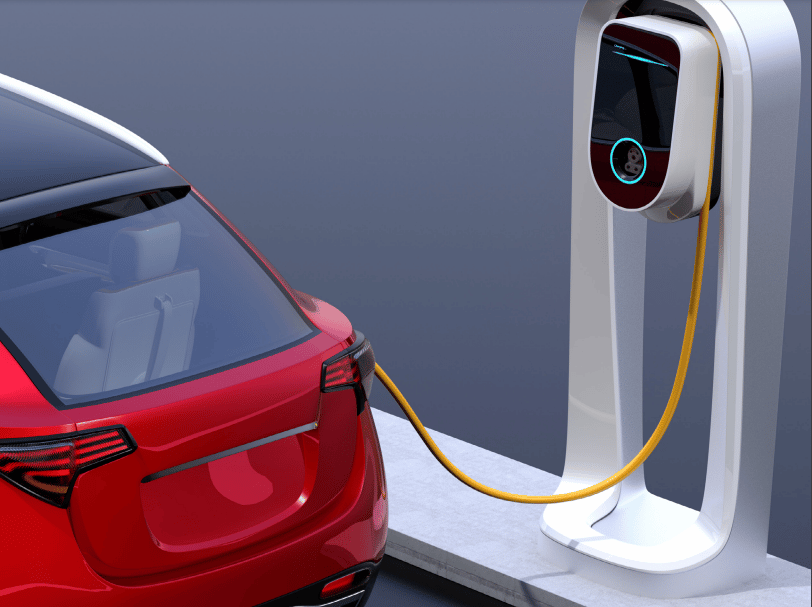
Home / EV Charging News / How much does a Charging Station for electric cars cost?
Electric vehicle (EV) charging stations can be installed in workplaces, multi-dwelling units, public places for commercial purposes, and others. Analyzing the EV charging stations cost is an efficient method to understand the benefits of the investment. In this article, we analyze the cost of a charging station for electric cars and explain the aspects involved in the installation of these devices.

Charging cost for electric cars varies on two factors: electricity and efficiency. Highly efficient electric cars consuming 27 kWh per 100 miles, represent a cost of $0.028 per mile, considering the average cost for electricity as ¢/10.7 per kWh. This means that the EV charging station cost per charge for a 200-mile range vehicle is close to $5.6.
Miles per Gallon (MPG) is a decades-old metric to define fuel efficiency for internal combustion engine vehicles. Kilowatt-Hours per 100 miles (kWh/100 miles) is an analog term coined for EVs, determining the power usage efficiency of these vehicles.
The cost to charge EVs in kilowatt-hours varies on the efficiency and mile range of the vehicle. The most efficient EVs represent around half the required kilowatt-hours compared to the most inefficient ones. This can be estimated considering the kWh/100 miles and mile range of the vehicle.
For instance, the 2021 Tesla Model 3 Standard has an efficiency of 24 kWh/100 miles and a mile range of 263 miles, requiring 63.12 kWh to fully charge. Less cost-effective 2020 Porsche Taycan Turbo S featuring a 50 kWh/100 miles efficiency and mile range of 192 miles, requires 96 kWh to charge. The difference can be up to 35% in costs and around $30 monthly for a 900-mile range use.
EVs are environmentally friendly since they do not release Carbon Dioxide (CO2) as greenhouse emissions, consume less energy, and represent lower driving costs.
Studies performed by the Transportation Research Institute of Michigan show that driving a vehicle for an average of 11,443 miles per year, represents fueling costs of $993 (Alabama) up to $1,509 (Hawaii). Charging EVs for the same mileage represents costs of $367 (Louisiana) up to $1,106 (Hawaii).
This means that internal combustion vehicles cost $8.67 – $13.18 to drive for 100 miles, while EVs cost $3.2 – $9.66 for the same 100 miles.
In general, the EV charging station price goes from $400 to $20,200 for Level 1 and Level 2 stations, while DC Fast Charging stations have prices going up to higher cost equipment increasing the price even further.
The price for an EV charging station depends on several factors like the cost of EV charging infrastructure, set by the utility, electrical equipment depending on the charging station level, soft costs, and software costs. In the following section, we analyze these factors in detail.
Residential EV charging stations only require local permits and simple hardware installations, while high capacity Level 1 and higher-level EV charger stations incur additional expenses due to the cost of EV charging infrastructure, equipment, soft costs, and software.
The infrastructure of EV charging stations has to match the voltage and current requirements for the EV charger. High capacity Level 1 and Level 2 charging stations require 120 to 240 volts feeders easily installed by certified electricians.
Higher level and more powerful charging stations might require dedicated 480 volts transformers to match input specifications for the equipment. These
The charger and the billing equipment (if required) is the most important part of the electric car charging station. The The Level 1 electric vehicle charging station cost can go from $300 to $1,500. Meanwhile, the Level 2 electric charging point cost goes from $400 to $6,500, with an average installation cost of $3,000. DC Fast Chargers are the most expensive options, representing a hardware EV charging station price that varies between $10,000 and $40,000, with average installations of $21,000.
Soft costs include additional expenses required to make charging stations more suitable for customers. Permits also fit into this category.
Permits have average costs equivalent to 5% of the overall cost of a charging station for electric cars, but this can vary in-between states. Other soft costs include signage, protective bollards, charging parking ports, custom logos for the chargers, and others. Reducing soft costs can
To apply for financial incentives, EV charging stations are required by utilities to have net metering systems and other software and network subscriptions monitoring the performance of the site. The data collected by the utility helps improve the charging stations and perform statistical analysis. The yearly software subscription cost of a charging station for electric cars rounds $84 for data services and $200 for network services.
Power Management strategies can be implemented in EV charging stations for smart integrations. This means featuring technologically advanced features adapting to The Internet of Things (IoT) and energy-saving features based on Time of Usage (TOU) tariffs.
Implementing these strategies can be done through specialized equipment like the CyberSwitch EVMC or by installing Smart EV Charger with pre-installed smart features, some of

Your Power Management Partner for Over 25 Years Future Generations Depend on Our Decisions Today ™
2024 © All rights reserved by CyberSwitching